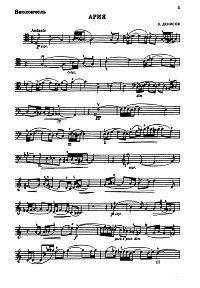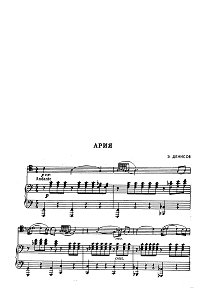Denisov - Aria for cello and piano
Denisov - Aria for cello and piano. You can download the PDF sheet music Denisov - Aria for cello and piano on this page. This unique expressive creative - classical music of music for cello of this brilliant composer. The moments of interference arising in the predominantly dodecaphonic linear web create a sense of "weightlessness", of musical proceedings that are impossible to localize, and indeed of "promise" and "comfort", which Edison Denisov, in a generally religious sense, counterposes to pessimistic or accusing gestures, which are far from his mind. The constructive element of his musical thinking is rooted in the relationship which Denisov perceives between music and mathematics. Denisov's orchestral textures are invariably delicate and airy, avoiding any massive sonorities. Following the example of Anton Webern, he transcends the realm of the abstract and technical to explore music rid of all unnecessary trimmings and inspired by the beauty of ideas.
To download PDF, click the "Download PDF" button below the appropriate sheet music image.
To view the first page of Denisov - Aria for cello and piano click the music sheet image. |
| PDF format sheet music |
|
|
|
Cello part: 2 pages. 63 K
|
Piano part: 6 pages. 198 K
|
 |
 |
|
|
| Download PDF (14.99
€) |
Download PDF (14.99
€) |
|
Edison Denisov (1929 – 1996) was a Russian composer in the so-called "Underground"—"Anti-Collectivist", "alternative" or "nonconformist" division of Soviet music.
The cycle for soprano and chamber ensemble Le soleil des Incas (1964), setting the poems by Gabriela Mistral and dedicated to Pierre Boulez, gave him an international recognition. This happened after the series of successful performances of the work in Darmstadt and Paris (1965). Igor Stravinsky liked the piece, discovering the "remarkable talent" of its composer. However, the piece was harshly criticised by the Union of Soviet Composers for its "western influences", "erudition instead of creativity", and "total composer's arbitrary" (Tikhon Khrennikov). After that, performances of his works were often banned in the Soviet Union.
Later he wrote a flute concerto for Aurèle Nicolet, a violin concerto for Gidon Kremer, works for the oboist Heinz Holliger, clarinettist Eduard Brunner and a sonata for alto saxophone and piano for Jean-Marie Londeix, that became highly popular among saxophone players. Among his major works are the operas L'écume des jours after Boris Vian (1981), Quatre Filles after Pablo Picasso (1986) and ballet Confession after Alfred de Musset. |
|